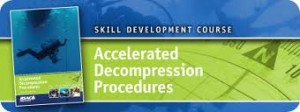I had wanted to do the BSAC Accelerated Decompression Course for quite some time, so when Nick suggested doing it at the National Diving and Activity Centre in Chepstow, I jumped at the chance. BSAC Wales region were running the course over three days, from Friday morning until Sunday afternoon. The ADP course allows the use of 50% nitrox during the dive and up to 80% nitrox for decompression at <10m which drastically reduces decompression obligations.
For a couple of weeks in the run up to the course we persisted with the three degree water at Wraysbury to get comfortable with our kit as much of it was new to us. I was diving manifolded twin 12s with a 7 litre ali stage, and Nick was using a 15 litre main cylinder with two 3 litre ponys clamped to the sides, one as a redundant source of the main gas and one for deco gas. Our time at Wraysbury was well spent as it allowed us to get our buoyancy and trim sorted out prior to the course and meant we were a step ahead on the first day.
On Friday morning we met the course boss, the two instructors and the other three students and fired straight into three hours of lectures covering physic, physiology, and equipment configuration. A lot of it was covering old ground, but it was a good recap and it did go into more depth in many areas than the Sports Diver and Dive Leader material does. Following a quick lunch, it was time for each of us to talk everyone else through our own kit configurations, explaining the choices we had made, and answering any questions directed at us. There wasn’t a single identical kit configuration and the instructors made some suggestions for improvements. This highlighted that configuration isn’t prescriptive, its personal choice, you can look like a Christmas tree if you want to! The afternoon dive was a shallow drills dive, showing competence in twin set shutdowns, buoyancy control, reg switching, out of gas drills, mid water dsmb deployment etc.
The following day, we once again met up at 9.30 and started on the lectures. This time covering accelerating decompression and dive planning. The course is focused around the BSAC ox-stop tables so planning with those was covered, as was using computer dive planners such as Suunto Dive Manager and Vplanner. The emphasis was that it is essential to have a backup to the dive computer. It also highlighted the importance of effective gas planning to ensure sufficient gas for the bailout plan in the event of a loss of deco gas. For the purposes of the course we were all diving air as our back gas and 50% as decompression gas, having everyone on the same gases made planning simpler. In the afternoon it was time for another dive. One of the instructors was leading and prompting the gas switches at the appropriate times. After all the blown out weekends this year and the murky inland sites it was a nice change to be diving somewhere with good visibility, 10-15m on Friday and Saturday. The “attractions” were visible from the surface and you could see between some of them. The downside to diving at Chepstow is the ladders you need to climb to get back onto the pontoons. You clip your stages off onto chains that run alongside them and then lug the weight of the twinsets up the ladders. We definitely earned our post dive curry!
We had a bit of homework on the Saturday night. We were to come up with the plans for the two dives that we would be doing on Sunday. The first was to be to 35m for 25 minutes and the second we planned to be 30m for 30 minutes. Over curry, Nick and I planned our dives using various dive planners on our phones, comparing with our computers and the ox-stop tables. A review session on Sunday morning got everyone onto the same plan, dive slates with run-times were written and we were off. Again, two enjoyable dives, although a bit colder than the previous days, and no problems with any of the skills that were required of us.
Overall it was an enjoyable course and a very good venue for it. We stayed in the on-site accommodation which made it easy to crawl out of bed and go diving. The course was set at a good pace with lots of time for discussion and planning, and no feeling of being rushed. I’m now looking forward to putting the skills into practice on the upcoming trips to Cyprus and Scapa Flow.
BSAC members can attend regional events run across the country. A full list of the skills development courses running in 2013 can be found on the BSAC site.

